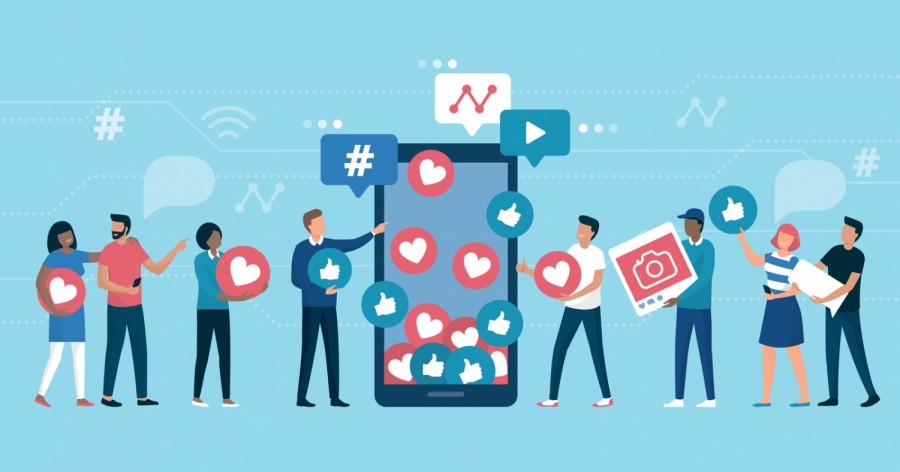The Impact of Social Media
November 19, 2021
Social media takes part in people’s day-to-day lives, whether they realize it or not. The positive and negative impact it leaves on them can change their lives completely. Let’s look at the positive and negative aspects of social media and how it has influenced society over time.
While stopping and thinking about how there are many negatives to technology and social media, there are some positives that can be acknowledged on the way. Firstly, technology has drastically helped improve connecting with family and friends all around the world. Many apps, designed on phones, make it easy and free to make calls, text, and even Facetime with those in other countries all over. Secondly, social media is a great way to express oneself, share experiences, and build relationships. Whether it is through fashion, art or music, it is easy to share work created with others as inspiration as well as showcasing. Sharing experiences and memories made is another well-rounded positive. A memory or experience someone had could possibly encourage another to try something they would have never before. Having lived in times of isolation, building and connecting relationships is critical. Even online friendships can bring so many people together and help one another feel loved and recognized.
With all the sugar comes spice; there are many negatives that can be dwelled on more than the positives. Technology and social media together can lead to many psychological and physical issues. Without these intentions, social media can also lead to social anxiety and even addictions very similar to drugs and smoking. Society as a whole has been crumbling for many years now due to technology and the lack of care for the environment. There are also many ecological problems steadily growing day by day.
Many teens spend an average of seven hours on screens during the day. This time is spent on various platforms of social media including Snapchat, TikTok, Instagram, Twitter, Facebook and so much more. When asked “On average, how many times do you pick up and look at your phone?”, many wouldn’t guess a lot. It is an addiction almost the whole entire world has developed; democracy is diminishing and our diets have begun to feed off of social media. It is noted that fake news on any platform spreads six times faster than real news. This situation is not even a matter of addiction, it is simply that fake news is more ‘interesting’ to people, causing it to spread so fast, making violence and chaos spread even faster.
Producing many influencers, social media is a hit all around the world. Their morning routines, “get ready with me’s”, and “day in my life’s” can be inspiring to many, but upsetting to some. ‘Wake up at 6 am, read a chapter of a book, workout for an hour, shower and start the day.’ These kinds of routines for many can be profitable, but for others can start the concern of ‘why doesn’t my life look like that’. These kinds of thoughts and mindsets overtime, can lead to mental slumps and a decrease in motivation.
“They, as humans, are not the buyers of social media, but the product being sold. They, as humans, are also financially more worthy, dead to life on a screen than alive living in the present moments,” says Tristan Harris, Former Google Design Ethicist. This analogy is also used for trees in our ecosystems, which if kept unhealthy and cut down, will rapidly destroy our world and everything around it.
Technology has shaped society to be the way it is, and now society cannot help heal itself. Learning how to balance technology and social media with living in the present and enjoying life is essential. Setting limits and boundaries as well as learning how to acknowledge that even celebrities have bad days too, is beneficial. Although not all of the world’s problems can be fixed at once, this can lead to the start of a new and healthier era.



